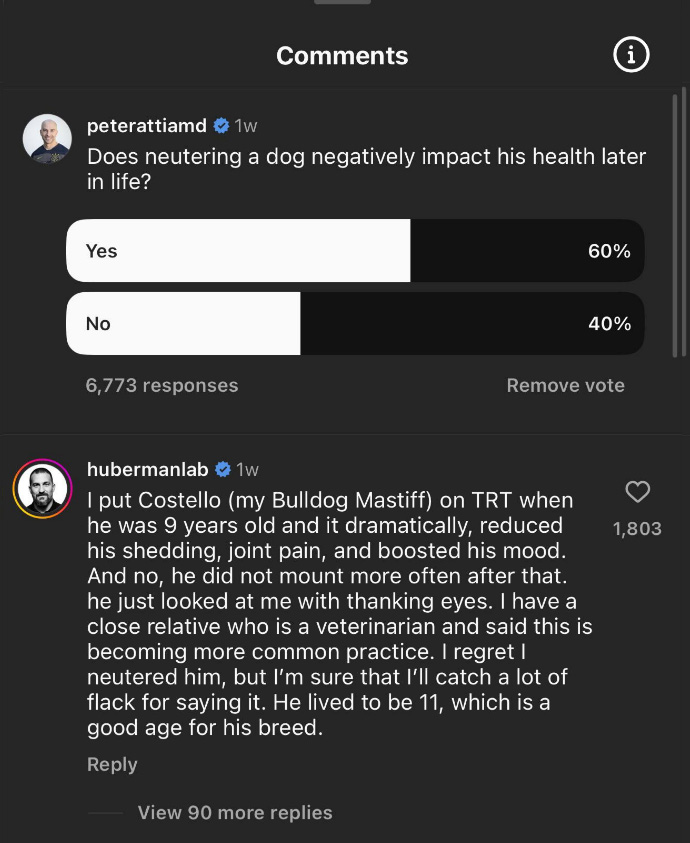In a recent social media post, physician and longevity expert Dr. Peter Attia sparked an intriguing debate about the long-term health implications of neutering dogs at a young age. Attia, who owns a nine-month-old Australian Shepherd puppy, expressed his concerns about the potential negative effects of early neutering on canine health.
Attia questioned whether removing testosterone from a young dog’s system could lead to future health issues, particularly regarding bone health, muscle mass, and insulin sensitivity. He acknowledged the conventional wisdom supporting neutering but sought input from his followers on any scientific studies addressing the pros and cons of the procedure.

The post quickly garnered attention from pet owners and experts alike. Neuroscientist Dr. Andrew Huberman joined the conversation, sharing his personal experience. He revealed that he had started his Bulldog Mastiff on testosterone replacement therapy (TRT) at age nine, reporting significant improvements in his dog’s shedding, joint pain, and overall mood. Huberman also mentioned that a veterinarian relative informed him that TRT for older dogs is becoming more common practice.
According to Huberman, his dog had been experiencing various health issues eight years after being neutered, including weight gain, excessive shedding, and joint pain. On the advice of a friend, Huberman began administering 10 to 20 milligrams of testosterone weekly.
The results, as described by Huberman, were striking. “Everything changed,” he told Joe Rogan during an appearance on his podcast. “His appetite came back, he stopped shedding, he leaned out.” Huberman even noted improvements in his dog’s breathing and sleep patterns.
This experience led Huberman to question the practice of routine neutering in male dogs. He expressed the opinion that castrating male animals without an exceptionally good reason is “actually cruelty to animals.” Huberman admitted that he had his dog neutered earlier in life, not knowing better at the time.
The practice of neutering male dogs, a routine procedure in many parts of the Western world, carries vastly different connotations across various cultures. While widely accepted in countries like the United States and much of Europe, neutering is approached with greater hesitation or outright rejection in many Eastern nations and traditional societies. These diverse cultural views don’t just influence pet ownership practices—they may also be subtly shaping the scientific research conducted on the topic.
In Western countries such as the United States, Canada, and much of Europe, neutering male dogs is generally seen as a positive and even necessary step for responsible pet ownership. The primary reasons behind this practice range from population control to behavior modification and health benefits. Animal welfare organizations in these regions frequently advocate for neutering as a way to reduce the number of unwanted animals and prevent aggressive behaviors often attributed to testosterone-driven instincts in unneutered dogs.
In contrast, many parts of Asia and traditional societies in regions like the Middle East view neutering male dogs with greater skepticism. The reluctance stems from various cultural beliefs and practices. For example, in countries like Japan, preserving an animal’s natural state is highly valued. There is a concern that neutering might alter a dog’s vitality or personality, which for some is seen as interfering with the dog’s inherent nature. This contrasts sharply with the Western view, where neutering is linked to taming unwanted behaviors and improving health.
A veterinarian contributing to the discussion provided valuable insights, citing a 2020 study published in Frontiers in Veterinary Science. The research, titled “Assisted decision-making on age of neutering for 35 breeds of dogs: associated joint disorders, cancers, and urinary incontinence,” suggests that delaying neutering in large breed dogs until after skeletal maturity may protect against certain developmental orthopedic diseases.
This growing body of evidence has made the timing of neutering a hot topic in veterinary circles.
It’s challenging to discern where the truth lies, as is often the case with biohacking. On one hand, experts from certain countries recommend neutering, while experts from other regions advise against it. Ultimately, it seems to be a hot-button topic: How much masculinity is the societally appropriate amount?


